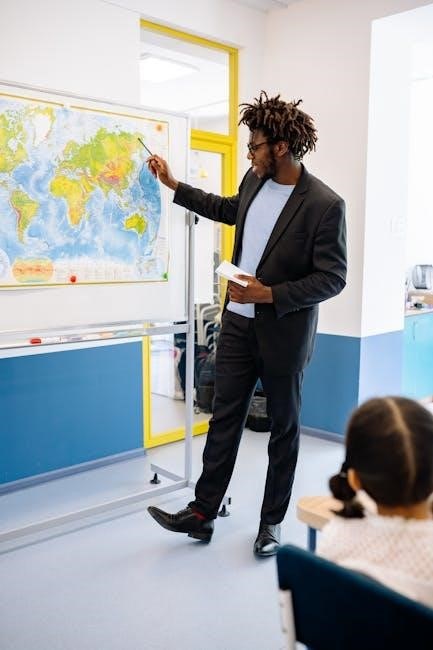Formal education involves structured learning led by specially trained teachers, following recognized policies to foster personal development and societal progress through systematic instruction and cultural transmission.
1.1 Definition of Formal Education
Formal education is a structured and organized system of learning, typically provided in schools, where specially trained teachers deliver instruction following officially recognized policies. It emphasizes systematic transmission of knowledge, skills, and cultural values, ensuring students meet predefined educational goals. This form of education is characterized by a formal curriculum, disciplined environment, and certified instructors, aiming to prepare individuals for personal and societal development through organized and sequential learning experiences.
1.2 Importance of Formal Education in Society
Formal education is vital for societal development, fostering economic growth and personal progress. It equips individuals with essential skills, knowledge, and values, enabling them to contribute effectively to society. By transmitting cultural norms and promoting socialization, formal education strengthens community cohesion and cultural identity. It also addresses inequalities by providing structured opportunities for all, ensuring a skilled workforce and informed citizenship. The role of specially trained teachers in this system is crucial, as they guide students in achieving these outcomes through systematic instruction and support.
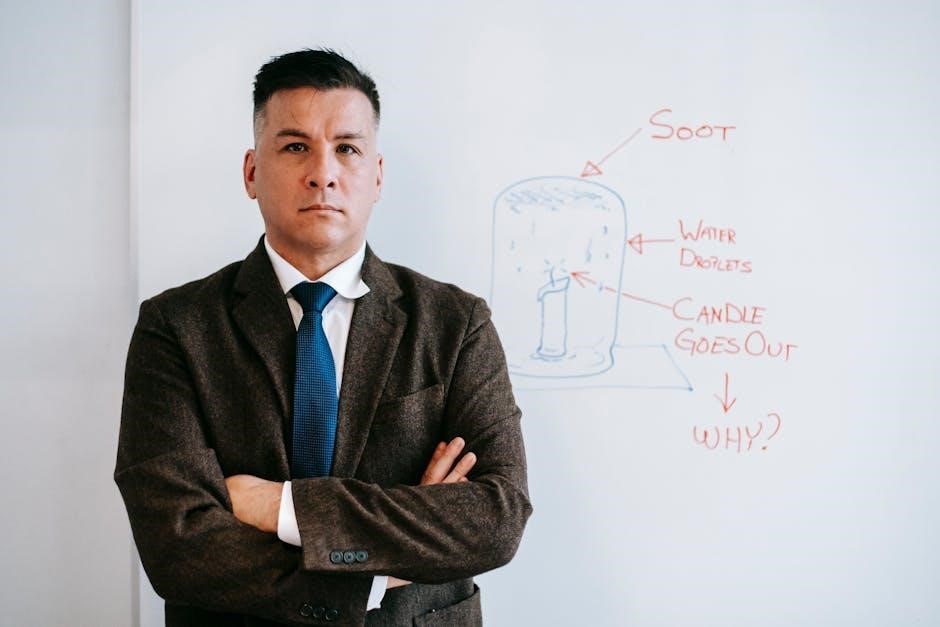
Characteristics of Formal Education
Formal education is defined by structured learning environments, instruction by specially trained teachers, and adherence to officially recognized policies and curricula, ensuring standardized and systematic knowledge delivery.
2.1 Structured Learning Environment
A structured learning environment in formal education is characterized by organized classrooms, set schedules, and clearly defined goals. Specially trained teachers create a disciplined setting, ensuring systematic instruction and adherence to curriculum standards. This environment promotes focused learning, cultural transmission, and socialization, with students progressing through predefined stages, from elementary to higher education. The structured setup ensures consistency, accountability, and measurable outcomes, fostering intellectual and personal growth while preparing students for future roles in society.
2.2 Specially Trained Teachers
Specially trained teachers are essential in formal education, bringing expertise and qualifications to deliver structured instruction. They undergo rigorous education and continuous professional development to effectively guide students. These teachers implement recognized policies, create personalized education plans, and employ specialized techniques to address diverse learning needs. Their role extends beyond academics, fostering cultural values and social integration. With advanced skills in classroom management and assessment, they ensure students meet educational goals, making them indispensable in the formal education system’s success and quality.
2.3 Officially Recognized Policies and Curriculum
Formal education operates under officially recognized policies and a structured curriculum, ensuring consistency and quality. These policies guide instructional practices, assessment methods, and learning outcomes. The curriculum is systematically designed to meet educational goals, reflecting societal values and academic standards. Teachers adhere to these frameworks, delivering instruction aligned with predefined objectives. Such policies also ensure equity and accessibility, accommodating diverse student needs while maintaining rigorous academic expectations. This structured approach fosters a cohesive learning environment, preparing students for future challenges and societal roles.
Types of Educational Programs in Formal Education
Formal education offers diverse programs, including general studies, vocational training, and college-preparatory studies, each tailored to meet varying student interests and career aspirations.
3.1 General Studies
General studies in formal education provide a broad, well-rounded curriculum, focusing on core subjects like mathematics, science, and language arts. These programs are designed to develop essential skills and knowledge, preparing students for a wide range of academic and professional paths. Specially trained teachers guide students through a structured learning environment, ensuring a solid foundation for future endeavors. This approach emphasizes critical thinking, creativity, and adaptability, equipping students with the tools needed to succeed in an ever-evolving world.
3.2 Vocational Training
Vocational training within formal education focuses on equipping students with practical skills for specific careers. Specially trained teachers provide hands-on instruction, emphasizing real-world application. These programs often include apprenticeships, technical courses, and industry-specific certifications. The structured environment ensures students gain expertise in fields like technology, healthcare, or trades. Vocational training aims to prepare individuals for immediate entry into the job market, bridging the gap between education and employment. This approach ensures students are job-ready, with skills tailored to industry demands, enhancing their employability and career prospects;
3.3 College-Preparatory Studies
College-preparatory studies are specialized programs within formal education designed to prepare students for higher education. These programs emphasize advanced coursework, critical thinking, and study skills. Specially trained teachers guide students through rigorous academic curricula, often including honors or Advanced Placement courses. The focus is on developing analytical and problem-solving abilities, ensuring students are ready for the challenges of college. These studies also include preparation for standardized tests like the SAT or ACT, further equipping students for successful transitions to higher education. The structured approach ensures a smooth pathway to university-level studies.
The Role of Specially Trained Teachers
Specially trained teachers guide students in formal education, delivering structured curricula and fostering academic and personal development through effective instruction and specialized teaching techniques.
4;1 Qualifications and Certification
In formal education, teachers must hold specific qualifications and certifications, ensuring they are equipped to deliver structured curricula effectively. These typically include Bachelor’s degrees and teaching licenses.
Teachers undergo continuous professional development through workshops and training, enhancing their skills and staying updated on educational practices. These qualifications ensure they can support students’ academic and personal growth effectively.
4.2 Teaching Methods and Techniques
Specially trained teachers employ diverse teaching methods tailored to student needs, fostering engagement and understanding. These include personalized learning plans, interactive activities, and technology integration, ensuring effective knowledge delivery and skill development.
4.3 Student Assessment and Progress Monitoring
Specially trained teachers use formal and informal assessments to monitor student progress, ensuring learning objectives are met. These evaluations help identify strengths, areas for improvement, and the need for additional support, guiding personalized instruction. Regular progress monitoring allows teachers to adapt their methods, ensuring students stay on track and achieve their educational goals effectively.
The Structure of Formal Education
Formal education is organized into primary, secondary, and higher education levels, each with specially trained teachers adhering to standardized policies, ensuring a progressive learning framework.
5.1 Primary Education
Primary education is the foundational stage of formal education, typically for children aged 5 to 11. It is delivered by specially trained teachers who follow structured curricula to develop basic literacy, numeracy, and social skills. This level emphasizes creating a supportive learning environment, fostering creativity, and preparing students for higher education. Teachers use innovative methods to cater to diverse learning needs, ensuring a strong academic and personal growth foundation.
5.2 Secondary Education
Secondary education builds on primary education, typically catering to students aged 12 to 18. It involves specially trained teachers delivering advanced curricula, preparing students for higher education or vocational paths. This stage focuses on subject specialization, critical thinking, and practical skills. Teachers employ modern methodologies to engage students and address diverse learning needs. Secondary education emphasizes academic rigor, personal growth, and social development, with assessments like standardized tests and evaluations tracking student progress and readiness for future opportunities.
5.3 Higher Education
Higher education represents the pinnacle of formal education, offering advanced learning in specialized fields. Specially trained teachers and professors deliver sophisticated curricula tailored to foster expertise and innovation. This stage emphasizes research, critical analysis, and independent learning. Institutions implement rigorous assessment methods, including dissertations and exams, to evaluate student mastery. Higher education prepares individuals for professional roles, equipping them with the knowledge and skills to contribute to their fields and society at large, while also fostering lifelong learning and personal growth through structured academic programs.
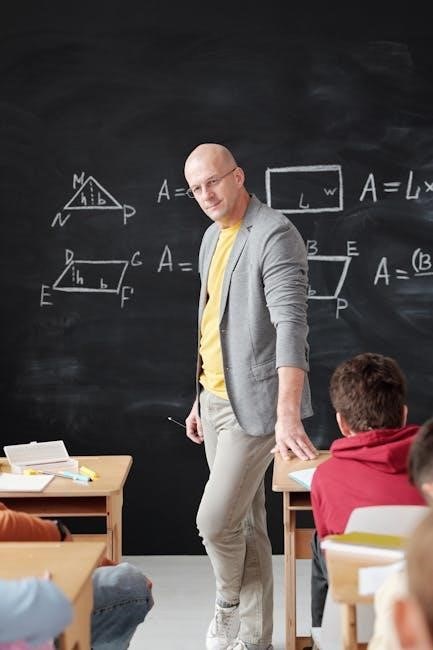
Policies and Curriculum in Formal Education
Formal education establishes structured policies and standardized curricula, ensuring consistency in teaching and learning objectives. These frameworks guide specially trained teachers in delivering education that meets societal needs.
6.1 Officially Recognized Policies
Officially recognized policies in formal education ensure standardization and accountability. These policies are developed by educational authorities and regulate curriculum design, teaching methodologies, and assessment practices. They provide a framework for specially trained teachers to deliver consistent, high-quality instruction. Compliance with these policies is mandatory for educational institutions, ensuring that students receive a uniform and equitable learning experience; Such policies also promote the integration of cultural and social goals, fostering a cohesive educational environment that aligns with societal expectations and standards.
6.2 Curriculum Development and Implementation
Curriculum development involves creating structured learning programs aligned with educational goals. Specially trained teachers collaborate with experts to design curricula that meet diverse student needs. Implementation ensures these plans are delivered effectively, fostering academic achievement and skill development. Regular updates and evaluations guarantee relevance and quality, preparing students for future challenges while maintaining educational standards and promoting continuous improvement in teaching and learning processes.
Cultural and Social Goals in Formal Education
Formal education fosters cultural transmission and social integration, preparing students to contribute to society by instilling shared values and promoting mutual understanding through structured learning environments.
7.1 Transmission of Cultural Values
Formal education plays a vital role in transmitting cultural values by teaching traditions, social norms, and respect for diversity. Specially trained teachers ensure students learn core values, fostering national identity and societal cohesion. This structured process helps students understand their cultural heritage, promoting unity and shared understanding. By integrating cultural values into the curriculum, formal education prepares individuals to contribute positively to their communities, preserving cultural legacy while encouraging inclusive growth and mutual respect among diverse groups.
7.2 Socialization and Community Integration
Formal education fosters socialization by providing structured environments where students interact with peers, developing essential communication and teamwork skills. Specially trained teachers guide these interactions, promoting inclusivity and respect for diversity. Through group activities and collaborative learning, students build social competence, preparing them for active community engagement. Schools act as hubs for cultural exchange, enabling students to integrate into society by understanding shared values and norms. This process equips individuals to contribute positively to their communities, fostering a sense of belonging and responsibility.
Teaching Methodologies in Formal Education
Formal education employs diverse teaching methodologies, combining traditional lectures with modern digital tools, to engage students and enhance learning outcomes effectively.
8.1 Traditional Teaching Methods
Traditional teaching methods in formal education emphasize structured, teacher-led instruction, often involving lectures, textbooks, and standardized assessments. These methods focus on delivering a predetermined curriculum, ensuring consistency and adherence to established educational standards. Specially trained teachers utilize tried-and-tested techniques to impart knowledge, fostering discipline and foundational understanding. While effective for conveying core concepts, these methods are increasingly complemented by modern approaches to enhance engagement and cater to diverse learning styles.
8.2 Modern and Innovative Teaching Approaches
Modern teaching approaches in formal education emphasize technology integration, interactive learning, and student-centered methods. Digital tools, such as educational software and online resources, enhance engagement and personalize instruction. Innovative techniques like project-based learning and flipped classrooms encourage critical thinking and collaboration. Specially trained teachers adapt these methods to cater to diverse learning styles, fostering creativity and real-world problem-solving skills. These approaches aim to prepare students for future challenges while maintaining the structured foundation of formal education.
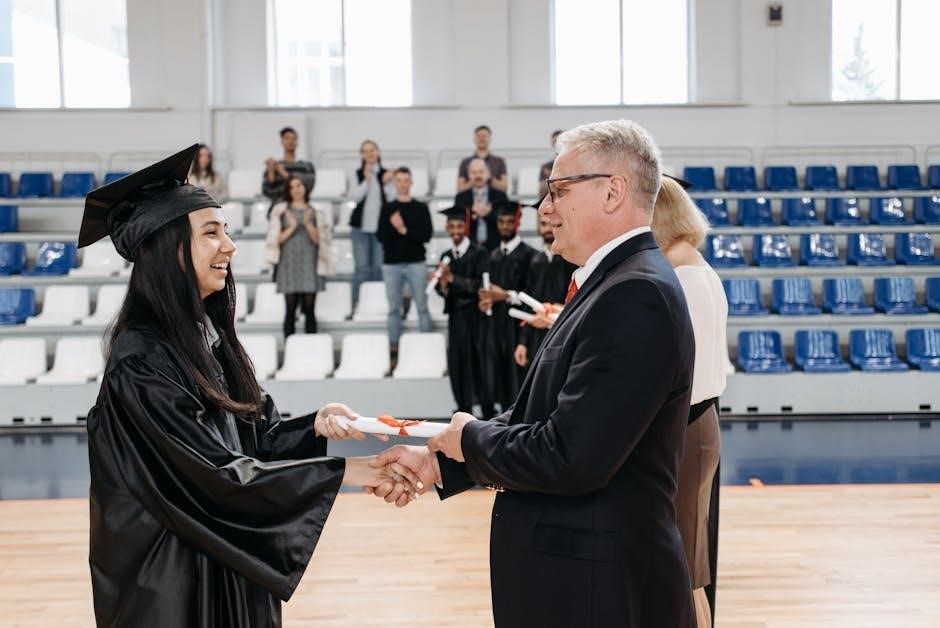
Assessment and Evaluation in Formal Education
Assessment and evaluation in formal education involve systematic methods to measure student learning outcomes, ensuring accountability and guiding instructional improvements, led by specially trained teachers.
9.1 Types of Assessments
In formal education, assessments vary to evaluate student progress. Formative assessments, like quizzes and classwork, monitor learning during lessons. Summative assessments, such as exams and projects, measure understanding at the end of a course. Diagnostic assessments identify learning gaps, while benchmark assessments track progress against standards. These methods ensure teachers can adjust instruction and students receive clear feedback, fostering a well-rounded evaluation process.
9.2 Evaluation of Student Progress
Evaluation of student progress in formal education involves systematic assessments to track learning outcomes. Teachers use formative and summative methods to monitor development, ensuring alignment with curriculum goals. Progress is measured through grades, feedback, and performance data, helping identify strengths and areas for improvement. Regular evaluations guide instructional adjustments and support personalized learning. This process fosters accountability and helps students achieve educational milestones effectively, while also informing teacher professional development and resource allocation to enhance overall educational quality and student success.
Special Education in Formal Education
Special education provides specialized instruction for students with special needs, delivered by specially trained teachers using tailored methods to ensure inclusive and effective learning experiences.
10.1 Specialized Instruction for Students with Special Needs
Specialized instruction in formal education addresses the unique needs of students with disabilities or exceptionalities. Specially trained teachers create personalized education plans, employing tailored teaching techniques to ensure inclusive learning. These educators are equipped to handle diverse learning styles, providing individualized support to foster academic and social growth. The focus is on creating an accessible and engaging environment, often involving collaboration with speech therapists, physiotherapists, and other specialists to help students achieve their full potential.
10.2 Role of Specially Trained Teachers in Special Education
Specially trained teachers in special education play a vital role in delivering tailored instruction to students with diverse learning needs. They design personalized education plans, employing specialized techniques to address unique challenges. These educators collaborate with therapists and specialists to ensure holistic development. Their expertise ensures students receive the support needed to thrive academically and socially, fostering an inclusive and supportive learning environment that caters to individual differences and promotes overall growth.
Professional Development for Teachers
Professional development involves continuous training and workshops for teachers, enhancing their skills and knowledge to improve teaching quality and stay updated with educational trends and methodologies.
11.1 Continuous Training and Workshops
Continuous training and workshops are essential for teachers in formal education, ensuring they stay updated on modern teaching methods and curriculum developments. These programs, often conducted by educational institutions or professional organizations, focus on enhancing instructional skills, incorporating technology, and addressing diverse student needs. Workshops provide hands-on experiences, fostering collaboration among educators and enabling them to adapt to evolving educational demands effectively. This ongoing professional development is crucial for maintaining high teaching standards and delivering quality education to students.
11.2 Impact of Professional Development on Teaching Quality
Professional development significantly enhances teaching quality by equipping educators with innovative methods and updated knowledge. Teachers gain improved instructional strategies, better classroom management, and the ability to address diverse student needs. This leads to more engaging lessons, increased student achievement, and a stronger educational environment. Continuous development ensures teachers remain effective in delivering the curriculum, fostering academic excellence, and preparing students for future challenges. Ultimately, it strengthens the overall quality of formal education, benefiting both students and society. This investment in teacher growth is vital for sustaining high educational standards.
Technology Integration in Formal Education
Technology integration in formal education enhances learning through digital tools, interactive content, and online platforms, enabling specially trained teachers to deliver high-quality, engaging instruction effectively.
12.1 Use of Digital Tools in the Classroom
Digital tools transform the classroom experience, enabling specially trained teachers to deliver interactive and engaging lessons. Tools like educational software, interactive whiteboards, and tablets enhance learning by providing visual and hands-on experiences. These technologies allow teachers to incorporate multimedia content, simulations, and gamified learning apps, making complex concepts accessible. Digital tools also facilitate personalized learning, enabling teachers to cater to diverse student needs. By integrating these resources, educators create dynamic learning environments that foster active participation and deeper understanding, aligning with modern educational goals and improving student outcomes effectively.
12.2 Online Learning Platforms and Resources
Online learning platforms and resources have become integral to formal education, offering structured digital environments for teaching and learning. These platforms, such as Learning Management Systems (LMS), provide access to curated content, interactive activities, and collaborative tools. Specially trained teachers utilize these resources to deliver lessons, assign tasks, and monitor progress remotely. Platforms like Moodle, Canvas, and Google Classroom enable seamless communication and resource sharing, fostering engagement and flexibility. Additionally, online libraries and educational databases offer students diverse learning materials, enhancing their academic experience and supporting personalized learning needs effectively.
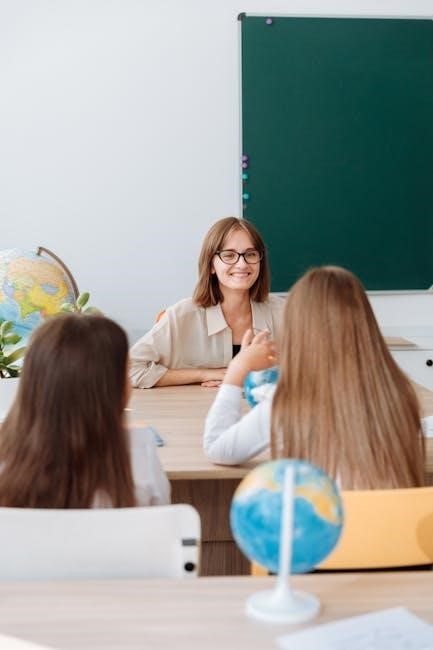
The Role of Schools in Formal Education
Schools serve as structured environments for formal education, implementing recognized curriculum and policies. They provide socialization, skill development, and access to trained teachers, essential for student growth.
13.1 School as a Learning Institution
Schools are foundational institutions in formal education, providing structured environments for learning. They employ specially trained teachers to deliver curriculum-aligned instruction, fostering academic and personal growth. Schools ensure access to organized learning resources and socialization opportunities, preparing students for future challenges. By adhering to recognized policies, schools maintain standards of education, ensuring equitable learning experiences. They also play a role in cultural transmission, shaping societal values and norms; Schools serve as hubs for holistic development, combining academic instruction with social and emotional growth, guided by qualified educators.
13.2 School Policies and Governance
School policies and governance frameworks ensure the effective operation of formal education institutions. These policies outline expectations for teaching, student conduct, and resource management, fostering a structured learning environment. Governance involves oversight by administrative bodies to maintain educational standards and equity. Trained teachers adhere to these policies, delivering curriculum-aligned instruction while ensuring student safety and inclusivity. Clear guidelines promote accountability, supporting the mission of schools to provide quality education. Effective governance also addresses community needs, ensuring schools remain adaptive to societal changes and educational advancements. This structured approach upholds the integrity of formal education systems.
Challenges in Formal Education
Challenges include ensuring equitable access, addressing teacher shortages, and meeting diverse student needs while maintaining educational quality and adapting to societal and technological advancements effectively.
14.1 Accessibility and Equity in Education
Ensuring accessibility and equity in formal education remains a significant challenge. Disparities in resource distribution, socioeconomic status, and geographic location often limit access to quality education. Additionally, students with special needs require specially trained teachers and adaptive resources, which are not always available. Equity gaps persist, with marginalized groups facing barriers to equal educational opportunities. Addressing these issues involves implementing inclusive policies, increasing funding for underserved areas, and providing professional development for teachers to support diverse learning needs effectively. Equity in education is essential for fostering fair societal development and breaking cycles of inequality.
14.2 Challenges Faced by Teachers
Teachers in formal education face numerous challenges, including classroom management, diverse student needs, and adapting to new technologies. Many encounter shortages of resources and support, impacting their ability to deliver effective instruction. Additionally, the emotional and mental demands of teaching can lead to burnout. Continuous professional development is often required to stay updated with curriculum changes and innovative teaching methods. These challenges highlight the need for systemic support to ensure teachers can provide high-quality education and maintain their well-being in the demanding educational environment.
The Future of Formal Education
Formal education will evolve through technological advancements, personalized learning, and continuous teacher training, ensuring adaptive and inclusive systems that meet future societal and student needs effectively.
15.1 Emerging Trends in Education
Emerging trends in formal education include the integration of technology, personalized learning, and adaptive teaching methods. Digital tools and AI are transforming classrooms, enabling real-time feedback and tailored instruction. Specially trained teachers are increasingly adopting hybrid learning models, blending online and in-person education. There is also a growing emphasis on STEM education, sustainability, and global competencies. These trends aim to prepare students for future challenges, fostering innovation, critical thinking, and lifelong learning. Continuous teacher training and curriculum updates are essential to align education with evolving societal needs and technological advancements.
15.2 Innovations in Teaching and Learning
Innovations in teaching and learning are transforming formal education, with specially trained teachers leveraging digital tools, AI, and adaptive technologies. Personalized learning platforms and interactive simulations are enhancing engagement. Virtual and augmented reality are creating immersive learning experiences, while data-driven assessments improve student outcomes. Hybrid learning models blend in-person and online instruction, offering flexibility. These innovations enable teachers to address diverse learning needs effectively, fostering creativity and critical thinking. Continuous professional development ensures educators stay updated on these advancements, ensuring high-quality instruction and preparing students for a dynamic, technology-driven world.
